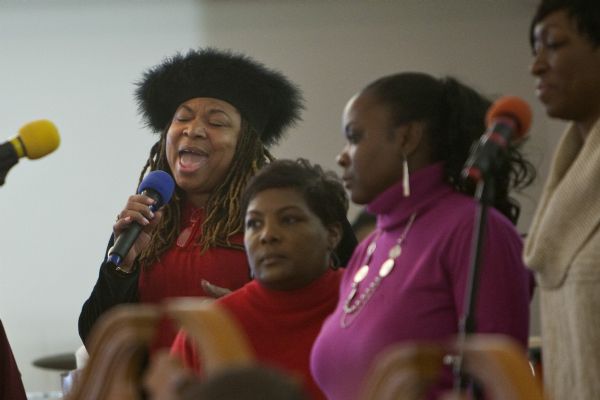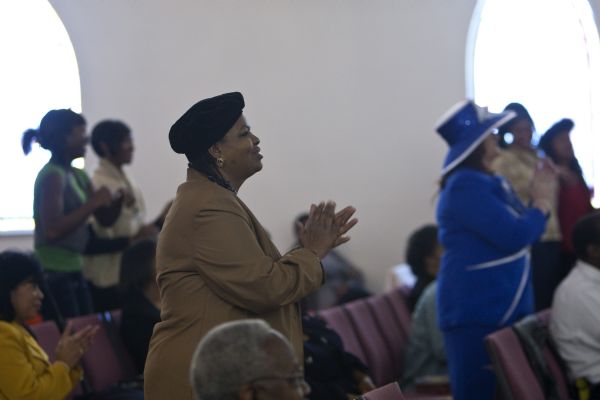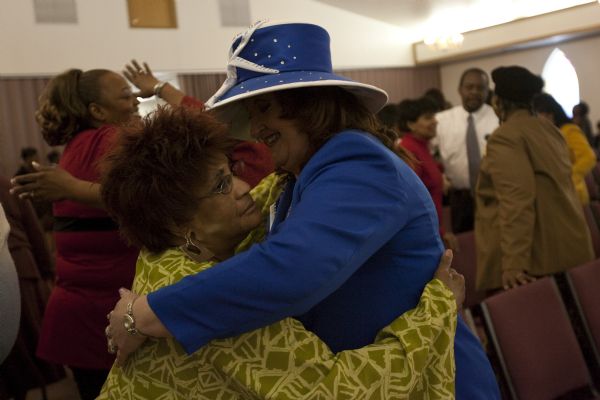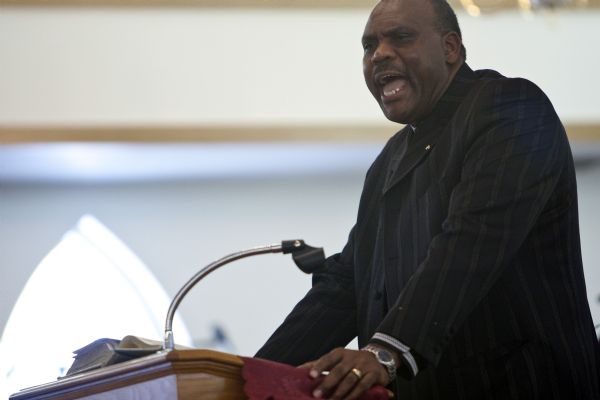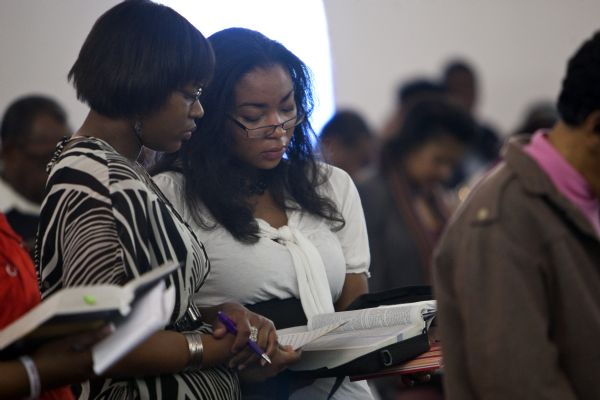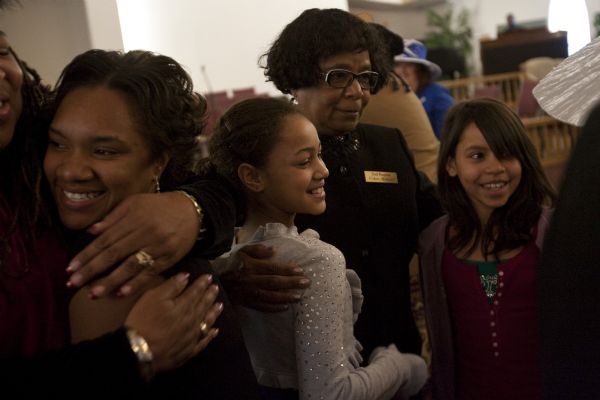This is an archived article that was published on sltrib.com in 2010, and information in the article may be outdated. It is provided only for personal research purposes and may not be reprinted.
Ogden » Midway through the Sunday service at Ogden's Second Baptist Church, there is a span of 10 minutes that looks uncannily like speed dating.
Men and women stride up and down the aisles and scoot between rows of chairs, shaking hands, hugging the willing, exchanging "how are yous?" with those they've known for decades and others they've just met.
It's called "sharing the love," says one man in a dark suit, white shirt and tie. "That's what Jesus did, isn't it?"
When the lights flicker, the worshippers know it's time to return to their seats (although most spend more time standing than sitting). As the men's chorus, accompanied by organs, kicks off a rousing "He's Never Failed Me," congregants stand, sway to the music, wave their arms and sing along.
Such hospitality and exuberance are hallmarks of black churches, which in Utah this Martin Luther King Jr. weekend will meet in nearly two dozen congregations from Ogden to West Valley City.
Whether Baptist, Methodist, Church of God in Christ or nondenominational Christian, thousands of worshippers take part in services much like the one in Ogden this Sunday morning.
After an hour of music and dancing that opens worshippers' hearts, as the Rev. Charles Petty puts it, the pastor takes to the pulpit. He decries the faithlessness of America, comparing it to Israel in the Book of Judges -- a time when there was no king and "everyone did as he saw fit."
His congregation punctuates Petty's preaching with "yes, sir; yes, sir," "hallelujah" or "well, well."
The message is not an easy one. "We are facing a real crisis. We have religion but no fear of God," says Petty, warning of the Almighty's wrath.
"Nevertheless," he says, launching into a list of the ways God continues to care for his people. "Nevertheless, grace and mercy."
It's Petty's powerful preaching, combined with the warm welcome of the Second Baptist community, that keeps Jackie Henley and her 3-year-old daughter, Brianna, coming back each Sunday.
Henley and her daughter live in Clearfield and have no family in Utah. She came 18 months ago from Indiana to take an information-technology job at Hill Air Force Base.
The church, she says, "it felt like family."
Asha Jones says that's what drew her as well. She grew up unchurched in Ogden but has been at Second Baptist since a fellow Weber State University student invited her nearly a decade ago.
"No matter who you are, what you are," Jones says, "you're treated like family."
It's about style, not skin color » Indeed, predominantly black churches are a respite for those who don't always feel comfortable in a white world, says Betty Sawyer, who on this Sunday sings a solo with the mass choir on "Order My Steps."
"It still provides that place of comfort where you can be yourself," says Sawyer, president of the Ogden chapter of the National Association for the Advancement of Colored People. "You don't have to have pretenses."
Not only do black churches help youngsters know their culture, Sawyer says, "coming to church each week helps you validate yourself. You come here to get renewed."
The Rev. France Davis, the pastor at Calvary Baptist Church in Salt Lake City for 35 years who wrote a history of black Baptist churches in the state, says the term "black church" refers not to a specific denomination, but to a style of worship.
"We're not talking about skin and color," Davis says, "but rather about a style of worship that is jubilant, exciting, a call-response style of worship."
None of Utah's predominantly black Christian churches is entirely black; all are open to every race.
Rooted in African and American traditions, the worship style makes everyone "equal and full participants," Davis says. "There are no big or little individuals. Each person is encouraged to be expressive as they see fit."
The faithful worship with their bodies, he says, not just their minds and mouths.
As Howard Chen, a native of Taiwan who visited Second Baptist on a recent Sunday, says, "It's not about singing and dancing. It's about coming to God's house with joy."
More than a century ago, Utah saw its first black churches: the Trinity African Methodist Episcopal Church in 1890 and Calvary Missionary Baptist in 1892, both in Salt Lake City.
Ogden's first black church was Wall Avenue Baptist Church, started in 1916.
Blacks, totaling nearly 35,000 in Utah, make up barely 1 percent of the state's population, according to 2008 Census estimates. But the number of predominantly black churches continues to expand here. There were a dozen in 1972, Davis says, and there are twice as many today.
The growth, he says, is from four sources: young families seeking a spiritual community; newcomers to the state; young people returning to Utah; and those drawn by the worship style.
"While many churches are complaining that there are people leaving," Davis says, "we're still growing."
Petty and Cache » Ogden's Second Baptist Church split from Zion Baptist, which continues strong just a few blocks away, in 1971, and built its current downtown church 11 years ago.
Petty, an Arkansas native, has been pastor for almost the entire time.
An officer on regional boards of the largely white Southern Baptist Convention and the predominantly black National Baptist Convention USA , Petty jokes that he adds "chocolate milk" when the Southern Baptists are too homogenized and some homogenization when the National Baptists are "too chocolate."
He turned 55 this month and plans to retire this spring as chief financial and human-resources officer for Hill Air Force Base's Utah Test and Training Range.
Then, he will be able to devote more time to coaching his sons' ball teams and to building up Second Baptist's Touch of Paradise Family & Youth Camp, a 19-acre site the church bought five years ago at the south end of Cache Valley, in Paradise.
Besides hosting members, it provides a place where the church can run camps for children whose parents are behind bars, an outreach that is year-round.
Second Baptist's range of ministries is one reason its members feel like family, Jones says. Almost every night, something is going on at the church.
During the football season, members gather Monday nights to watch games. On Wednesdays, there is Bible study; Fridays, choir practice, dance and mime lessons.
Church deacons are assigned a number of families. Like deacons in the early Christian church, these men check in on members, paying special attention to the elderly and widowed.
If an older member lives alone and needs her sink unplugged, that's what the deacon will do, says Deacon Terrence Ellis, of Clinton. "It's hard to say, 'I'll pray for you but not do anything else.' "
The women's ministry, led by Sawyer, conducts retreats, visits shut-ins, feeds the hungry and raises money to help the poor.
Ogden resident Lorraine Chambers began attending Second Baptist about the time she was diagnosed with multiple sclerosis 25 years ago.
Her church involvement has helped her cope. Although she uses a walker, she is the first on her feet to sing and sway with the music during worship.
"I get such joy out of it," Chambers says. "We all have a common bond. Everyone's on the same plane. The spirit we have goes deep."
kmoulton@sltrib.com" Target="_BLANK">kmoulton@sltrib.com


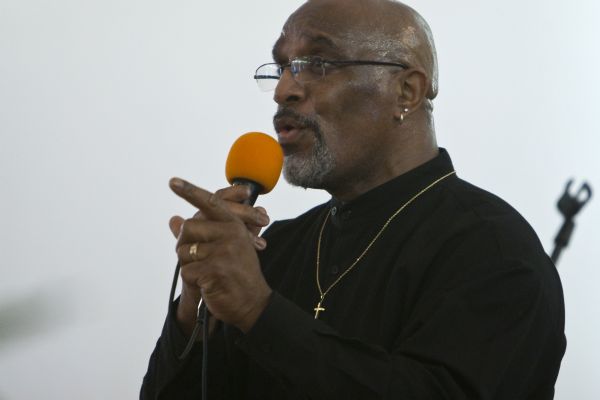
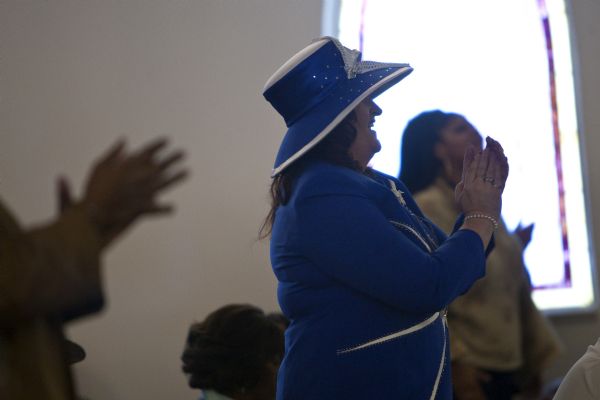
![Photo by Chris Detrick | The Salt Lake Tribune
Music Director Kevin Green leads the mass Choir during the Sunday morning worship service at the Second Baptist Church in Ogden Sunday January 10, 2010.
]](https://archive.sltrib.com/images/2010/0115/blackchurches_011610~3.jpg)
